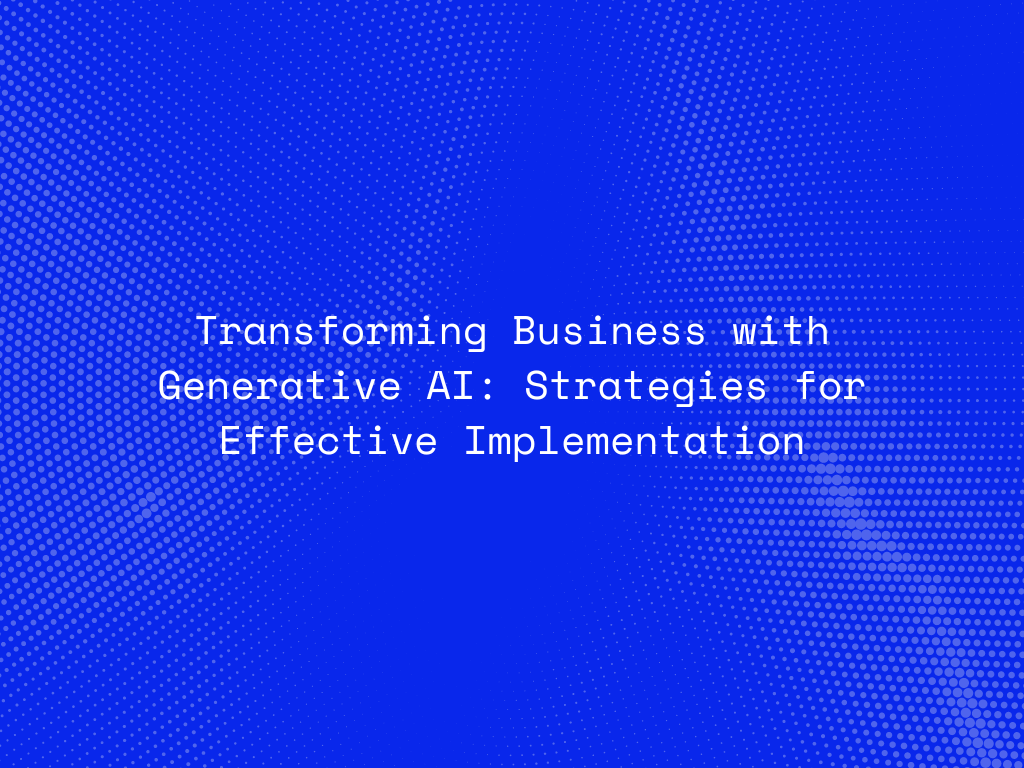The digital age is ushering in Generative AI as a transformative force across industries. From automating workflows to revolutionizing product development, businesses are rapidly adopting AI to stay competitive. But implementing generative AI effectively requires more than just technology; it involves strategy, change management, and an understanding of AI’s potential.
In this blog, we explore how businesses can successfully implement generative AI, the strategies that drive its adoption, and the best practices to maximize its impact.
Understanding Generative AI
Generative AI uses advanced machine learning algorithms to create new content, designs, and ideas from existing data. It can generate text, images, music, videos, and even simulations. Unlike traditional AI, which focuses on analysis and prediction, generative AI creates original outputs, unlocking innovation for businesses.
Why Implement Generative AI in Business?
The use of generative AI offers several key benefits:
- Increased Efficiency: AI can automate repetitive tasks such as content creation, customer service, and data analysis, allowing employees to focus on higher-value activities.
- Cost Reduction: By streamlining operations, businesses can reduce overhead costs and make more informed decisions, driving better ROI.
- Innovation: Generative AI opens new doors for product development, enabling businesses to create unique products, services, and experiences.
- Personalization: AI can generate highly personalized marketing campaigns, content, and user experiences, increasing customer engagement and satisfaction.
Key Strategies for Implementing Generative AI
1. Start with a Clear Use Case
Before diving into AI implementation, businesses should identify specific pain points or areas where AI can add measurable value. Whether it’s automating marketing processes, enhancing customer service, or improving supply chain operations, starting with a clear objective ensures focus and efficiency.
For example, a retail company might use AI to automate product descriptions or generate personalized offers for customers based on their purchase history.
2. Invest in AI Training and Skills Development
Successful implementation of AI requires having the right talent. Investing in AI training for employees helps them understand the technology and how to leverage it in their day-to-day work. Businesses should prioritize upskilling their teams in data science, machine learning, and AI tools to drive adoption.
Companies like Google and IBM offer AI certifications and training programs that can be integrated into organizational learning and development initiatives.
3. Collaborate with AI Experts
Partnering with AI vendors or experts is often essential, especially for companies that lack in-house AI expertise. By collaborating with specialized consultants, businesses can identify the right AI solutions, avoid common pitfalls, and tailor strategies to their unique needs.
AI consulting firms like Cognizant and Accenture provide end-to-end AI implementation services, helping businesses seamlessly integrate AI into their existing processes.
4. Build a Data Strategy
Generative AI thrives on data. To unlock its full potential, businesses need a robust data strategy that ensures access to high-quality, relevant data. This includes investing in data infrastructure, establishing clear data governance policies, and maintaining data security and privacy standards.
A strong data foundation enables AI algorithms to generate more accurate and effective outputs, leading to better decision-making and innovation.
5. Integrate AI with Existing Business Processes
Rather than completely overhauling your operations, focus on integrating AI into existing workflows. For instance, companies can use AI to enhance content creation by automating tasks like writing blog posts, generating reports, or creating product designs, without replacing human input entirely.
A hybrid approach, where AI complements human creativity and decision-making, often leads to better results than full automation.
6. Pilot Programs and Iterative Testing
To minimize risks and ensure success, start with pilot projects. These small-scale implementations allow businesses to test AI capabilities, gather feedback, and refine processes before scaling. Use A/B testing to compare the impact of AI versus traditional methods, and iterate on the results to improve outcomes.
Connect With Us
Overcoming Challenges in AI Implementation
While the potential for AI is vast, there are also challenges businesses must address:
- Cultural Resistance: Employees may fear AI will replace their jobs. Clear communication about how AI will enhance rather than replace their work is critical.
- Data Quality Issues: Poor or incomplete data can lead to inaccurate AI outputs. Businesses must ensure they have clean, reliable data for their AI models.
- Cost and Resource Constraints: AI implementation can be expensive, especially for small businesses. Start with scalable, cost-effective AI solutions and grow from there.
- Ethical and Legal Concerns: Ensure that AI implementation aligns with ethical guidelines and complies with data privacy laws, such as GDPR.
Best Practices for Maximizing AI Impact
- Cross-Functional Teams: Form teams with members from different departments (e.g., IT, marketing, operations) to ensure AI is used across various business functions.
- Continuous Learning: AI evolves rapidly. Stay updated with the latest advancements and trends in AI by attending conferences, webinars, or collaborating with AI communities.
- Monitor and Optimize: Regularly review the performance of AI-driven initiatives, analyze KPIs, and continuously improve based on data insights.
Conclusion
Generative AI holds the power to transform business operations by automating processes, fostering innovation, and improving decision-making. However, effective implementation requires a well-thought-out strategy, strong leadership, and a commitment to continuous learning. By starting with a clear use case, investing in AI talent, and integrating AI into existing workflows, businesses can successfully harness AI’s potential to drive growth and remain competitive in an ever-evolving digital landscape.




